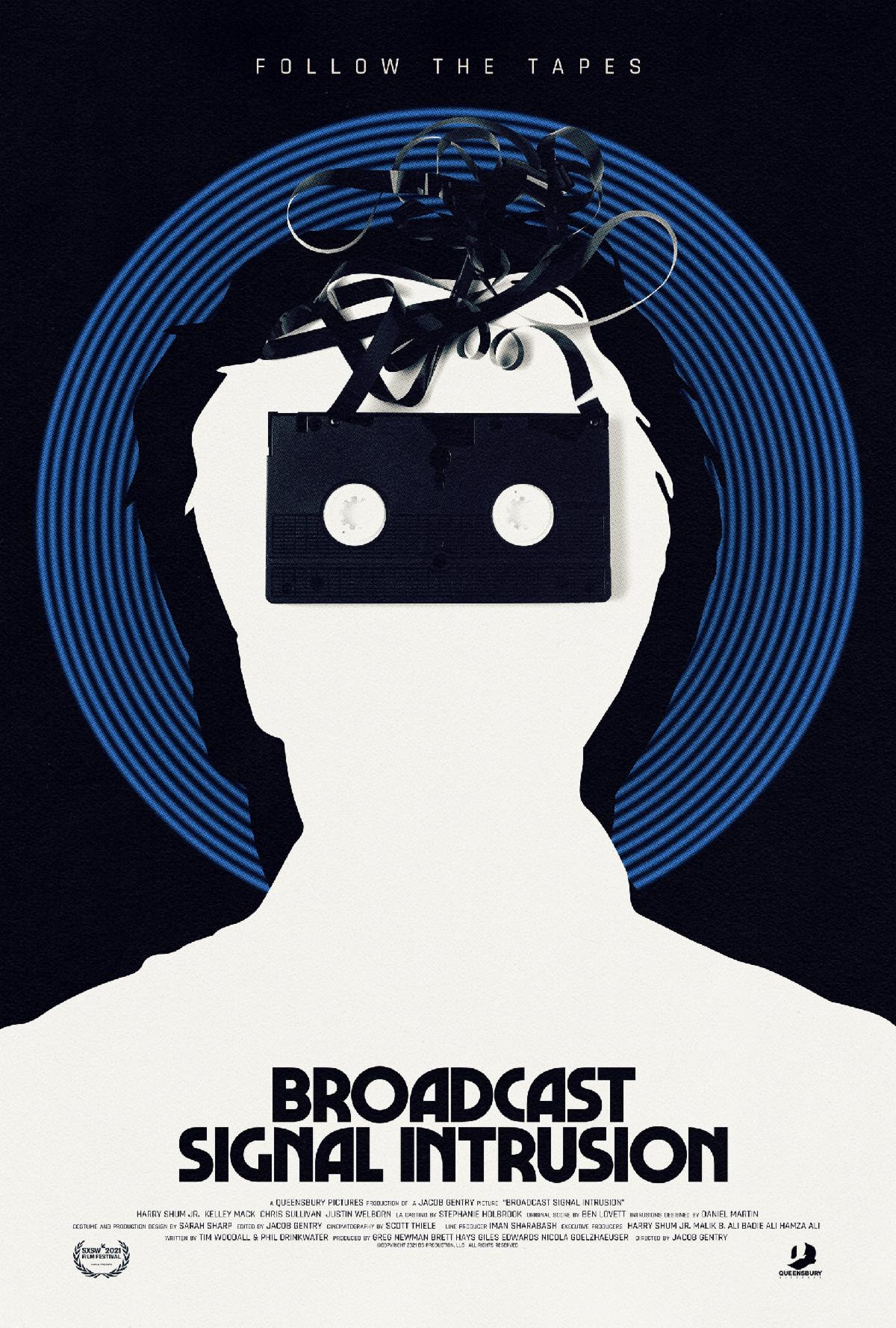SXSW: Hysterical, Potato Dreams of America, Introducing Selma Blair, and Broadcast Signal Intrusion
 Wednesday, March 17, 2021 at 1:20PM
Wednesday, March 17, 2021 at 1:20PM by Christopher James


There’s a lot that the pandemic has made harder. The one thing it has made easier has been attending film festivals from all around the country. Pre-pandemic, covering SXSW would’ve required a flight to Austin, Texas, inflated lodging costs and lots of pre-planning. Now, the only lines festival goers have to battle are online. Food is just an arms reach away in the kitchen (no more popcorn dinners).
Last year, SXSW was one of the first things cancelled as COVID-19 spread across the country. The festival is very different this year, but the quality of content is still great. The Film Experience will be covering the fest through the weekend. Here are a four takes from Day One. One comedy doc, an intimate celebrity piece, a noir, and a Russian comedy...
Hysterical
Imagine still having to answer the question “are women funny?” It’s decidedly not all laughs (though there are many) in director Andrea Nivens’ documentary Hysterical. The film looks at women in the stand-up comedy world and the unique challenges they face in such a male dominated industry. In some ways, the information in the documentary is a mile wide and a foot deep. On one hand, it charts the history of groundbreaking female comedians like Phyllis Diller, Moms Mabley and Joan Rivers, among others. Then it shifts the focus to the current state of popular female comics and the sexism they experience out on the road. Perhaps this structure, which feels somewhat all over the place, is appropriate. Sexism is woven into stand-up and there’s no easy or clean way to grapple with a problem so large and pervasive.
The documentary enlists a wide range of female comedians to share their stories, including Kelly Bachman, Margaret Cho, Fortune Feimster, Rachel Feinstein, Marina Franklin, Nikki Glaser, Judy Gold, Kathy Griffin, Jessica Kirson, Lisa Lampanelli, Wendy Liebman, Carmen Lynch, Bonnie McFarlane, Sherri Shepherd and Iliza Shlesinger. What’s striking is not how different their stories are, but rather how similar the experiences of all the women are. This industry has not been kind or welcoming to women in ways both overt and covert. While male comedians get to enjoy wild nights on the road in dingy motels, female comedians worry for their safety as the same motels are ineffective in protecting them from stalkers or even fellow comedians.
The #metoo movement didn’t magically change the world, but it did shine a light onto sexual harrassment and discrimination in all industries, not just comedy. Two of the more interesting, specific incidents the documentary highlights are Kelly Bachman’s calling out of Harvey Weinstein and Kathy Griffin’s controversial stunt with a fake, severed Donald Trump head. Even in a seemingly more progressive world, there are still specific rules that seemingly only female comedians have to follow. Had the documentary been more focused on doing a deeper dive into a few key case studies, it may have been more salient and affecting. Still, Hysterical makes for an informative and entertaining watch. After all, these women are all very good at being funny. B

Hysterical premieres on FX on Friday, April 2nd and will be available on Hulu the following day.
Potato Dreams of America
It’s not easy growing up gay. It’s even harder when you’re trapped in the USSR, worrying about going into the military and holding your TV antenna just right to watch Working Girl. Writer/director Wes Hurley ambitiously adapts his life story spanning from post-Perestroika USSR to a typical Seattle suburb in the 90s and early 00s for Potato Dreams of America. As in Moonlight, three actors bring to life Hurley at different stages of his adolescence, teen years and young adulthood. Granted, no one in Chiron spoke to a hunky Jesus played by Aaron Samuels himself, Jonathan Bennett. Heartfelt earnesty blends with heightened camp for a really lovely final product.
When we begin in the USSR, young Vasili (Hersh Powers) yearns to live in America like the few American movies he’s able to watch. His mother, Lena (Sera Barbieri) shares his dreams, even dating a less-than-seemingly gentlemen solely for his color TV. She works as a prison doctor and becomes more and more disgusted by the corrupt government and fears that Vasili, nicknamed potato, will be sent to war when he turns of age. Thus, she registers as a mail order bride and is promptly sent for by a mystery American man. This highly stylized first half takes a while to adjust to. The actors all speak clear English and perform every scene with a campy raised eyebrow. Lea Delaria of Orange is the New Black fame even plays Potato’s very disapproving grandmother. Still, Hurley manages to lovingly look back at the harsher parts of his impoverished childhood, staying clear of many poverty porn cliches.
When Potato and Lena make it to America, everything changes… including the actors. Lena (Marya Sea Kaminksi) and Potato (Tyler Bocock) find themselves in the home of John (Dan Lauria), the right-wing Russian orthodox man who sent for Lena as his bride. Lena gets a job at a fast food restaurant to establish herself in this new land. Meanwhile, Potato embraces the newfound freedoms of America, but worries that his burgeoning homosexuality could draw the wrath of the homophobic John.
The film works much better in its goofier first half, which features visual and comic stylings akin to Hedwig and the Angry Inch or some of John Waters’ early films. Add on a Jojo Rabbit-esque vision of Jesus who loves American movies and you have a delightfully weird movie. Kaminksi and Bocock both give powerful performances that anchor the more conventional second half. It earns its sentimentality as both of the characters are lovably complex. Further wearing its inspirations on its sleeve, Potato further explores his sexuality by renting the VHS of Gregg Araki’s The Living End week after week. Potato Dreams of America throws a lot at the walls stylistically and not all of it sticks. Yet, most of it does work. As he further hones his craft, Hurley could become a major and wonderful queer artist. B+
Potato Dreams of America made its world premiere at SXSW. More information about the title can be found at its website.
Introducing Selma Blair
“I think I capture Norma Desmond pretty well,” Selma Blair croons into the mirror. The documentary Introducing Selma Blair opens with the familiar star putting on makeup and a shawl as she prepares to look as fabulous as possible for the documentary crew. Selma Blair stole scenes in so many iconic films in the late 90s and early 00s, such as Cruel Intentions, Legally Blonde and The Sweetest Thing. Suddenly, the fatigue sets in and quickly Blair’s speech slows and muscles tighten up. In 2018, Blair was diagnosed with multiple sclerosis (MS), an autoimmune disease that attacks nerves specifically in the spinal cord and brain. Within months, she opened up to Instagram about her diagnosis.
The documentary is less about Blair’s career or changing role within Hollywood. It’s more focused on bringing to light what it is like to live with MS and how one seeks treatment. After not seeing the success she wanted with harsher medications, Blair makes the decision to seek stem cell treatment. The whole process is chronicled with a good amount of detail. Blair’s biting wit and frank emotional openness keep the documentary focused on the human toll that goes through treatment.
Many documentaries are made or broken by the amount of access they are able to get to their subjects. Luckily, director Rachel Fleit gets unprecedented access to Blair, both during her highs and lows. The crew accompanies her all the way up to the day of her stem cell injection. This includes a tearful call with Selma’s withholding mother, reactions to a frightening complication and even lighter moments like using a dildo to massage her face during spasms. Having this level of cooperation from Selma Blair makes the film that much more compelling. It’s not that she has a lack of vanity or a desire to be documented or filmed. After spending so much time guarded, Blair seems ready to let go of emotional weight on camera, as there’s lots of other issues weighing her down. She’s not inspiring because she weathers her disability with a smile. Instead, she’s honest, open and never shies away from saying how she’s feeling. B
Introducing Selma Blair made its world premiere at SXSW.
Broadcast Signal Intrusion
Have you ever noticed anything strange when watching local TV stations? Director Jacob Gentry develops a thriller based on these random interruptions that looks and feels interesting, but never lives up to initial promise. Star Harry Shum Jr. does his best to furrow his brow and make this noir thriller compelling. Yet, a weak script may cause audiences to tune out pretty quickly into the broadcast.
James (Harry Shum Jr.) works as a video archivist at a Chicago station. His late nights at the graveyard shift allow him to avoid human contact, only venturning out during the day for grief counseling for those who have lost loved ones. His work also allows him to forgo sleep, not having to confront nightmares that have been happening since his wife’s disappearance. One night, a mysterious figure that resembles that of a creature in his nightmares appears during a random broadcast. This snaps James into action, as he investigates this phenomenon known as broadcast signal intrusion. As he goes through the three recorded broadcast signal intrusions since 1986 he pieces together a conspiracy that he thinks may hold the key to finding his missing wife.
Or does it? Broadcast Signal Intrusion never fully sells the audience on the “why” of the story. We understand why James is so driven to investigate, he wants to find his wife. Yet, the script by Phil Drinkwater and Tim Woodall connects the dots tenuously between James’ missing wife and the broadcast. Scenes either feel overplotted and filled with extraneous detail, or they jump to conclusions too quickly. James’ investigation forces him to cross paths with a large number of characters who all creepily spout exposition before disappearing, never to be seen again. A spunky drifter named Alice (Kelley Mack) at one point seems like she’s becoming James’ sidekick, though she never feels integral to the central mystery. All in all, the film becomes a frustrating watch, even if it is stylistically interesting.
Director Jacob Gentry manages to make this feel like a midnight movie all in the best ways. The evocative noir score by Ben Lovett and strong nighttime photography by cinematographer Scott Thiele also elevate the film. Though it doesn’t fully come together, Gentry shows promise as a sound thriller director. C-
Broadcast Signal Intrusion made its world premiere at SXSW.



Reader Comments (2)
Love Selma Blair.
Selma Blair is an awesome person and I always liked her. She was always a joy to watch whether in drama or in comedy. I'm glad to know she's got friends like Sarah Michelle Gellar to be there for her.